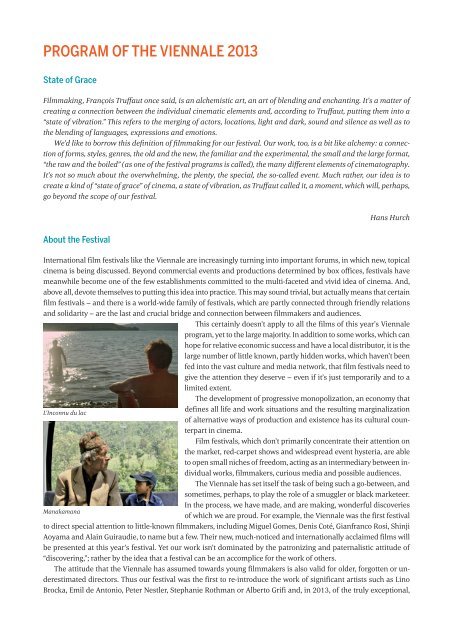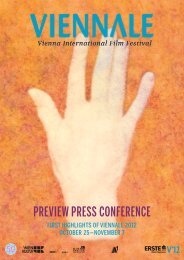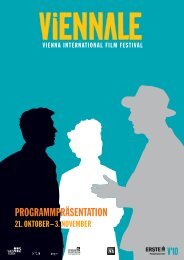Download press kit here - Viennale
Download press kit here - Viennale
Download press kit here - Viennale
Create successful ePaper yourself
Turn your PDF publications into a flip-book with our unique Google optimized e-Paper software.
PROGRAM OF THE VIENNALE 2013<br />
State of Grace<br />
Filmmaking, François Truffaut once said, is an alchemistic art, an art of blending and enchanting. It’s a matter of<br />
creating a connection between the individual cinematic elements and, according to Truffaut, putting them into a<br />
“state of vibration.” This refers to the merging of actors, locations, light and dark, sound and silence as well as to<br />
the blending of languages, ex<strong>press</strong>ions and emotions.<br />
We’d like to borrow this definition of filmmaking for our festival. Our work, too, is a bit like alchemy: a connection<br />
of forms, styles, genres, the old and the new, the familiar and the experimental, the small and the large format,<br />
“the raw and the boiled” (as one of the festival programs is called), the many different elements of cinematography.<br />
It’s not so much about the overwhelming, the plenty, the special, the so-called event. Much rather, our idea is to<br />
create a kind of “state of grace” of cinema, a state of vibration, as Truffaut called it, a moment, which will, perhaps,<br />
go beyond the scope of our festival.<br />
About the Festival<br />
Hans Hurch<br />
International film festivals like the <strong>Viennale</strong> are increasingly turning into important forums, in which new, topical<br />
cinema is being discussed. Beyond commercial events and productions determined by box offices, festivals have<br />
meanwhile become one of the few establishments committed to the multi-faceted and vivid idea of cinema. And,<br />
above all, devote themselves to putting this idea into practice. This may sound trivial, but actually means that certain<br />
film festivals – and t<strong>here</strong> is a world-wide family of festivals, which are partly connected through friendly relations<br />
and solidarity – are the last and crucial bridge and connection between filmmakers and audiences.<br />
This certainly doesn’t apply to all the films of this year’s <strong>Viennale</strong><br />
program, yet to the large majority. In addition to some works, which can<br />
hope for relative economic success and have a local distributor, it is the<br />
large number of little known, partly hidden works, which haven’t been<br />
fed into the vast culture and media network, that film festivals need to<br />
give the attention they deserve – even if it’s just temporarily and to a<br />
limited extent.<br />
The development of progressive monopolization, an economy that<br />
defines all life and work situations and the resulting marginalization<br />
L’Inconnu du lac<br />
of alternative ways of production and existence has its cultural counterpart<br />
in cinema.<br />
Film festivals, which don’t primarily concentrate their attention on<br />
the market, red-carpet shows and widespread event hysteria, are able<br />
to open small niches of freedom, acting as an intermediary between individual<br />
works, filmmakers, curious media and possible audiences.<br />
The <strong>Viennale</strong> has set itself the task of being such a go-between, and<br />
sometimes, perhaps, to play the role of a smuggler or black marketeer.<br />
In the process, we have made, and are making, wonderful discoveries<br />
Manakamana<br />
of which we are proud. For example, the <strong>Viennale</strong> was the first festival<br />
to direct special attention to little-known filmmakers, including Miguel Gomes, Denis Coté, Gianfranco Rosi, Shinji<br />
Aoyama and Alain Guiraudie, to name but a few. Their new, much-noticed and internationally acclaimed films will<br />
be presented at this year’s festival. Yet our work isn’t dominated by the patronizing and paternalistic attitude of<br />
“discovering,”; rather by the idea that a festival can be an accomplice for the work of others.<br />
The attitude that the <strong>Viennale</strong> has assumed towards young filmmakers is also valid for older, forgotten or underestimated<br />
directors. Thus our festival was the first to re-introduce the work of significant artists such as Lino<br />
Brocka, Emil de Antonio, Peter Nestler, Stephanie Rothman or Alberto Grifi and, in 2013, of the truly exceptional,




